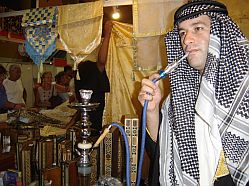 AnBA, Radwan Raad, who has been based in the city of Curitiba for around six years, is working on propagating art made in the Arab countries among the Brazilians. From Syria and Lebanon he brings from towels to items made out of marquetry and wall carpets. Raad has a shop in the southern Brazilian state of Paran
AnBA, Radwan Raad, who has been based in the city of Curitiba for around six years, is working on propagating art made in the Arab countries among the Brazilians. From Syria and Lebanon he brings from towels to items made out of marquetry and wall carpets. Raad has a shop in the southern Brazilian state of Paran
Raad has a store called "Adion Adivan – Artesanato Árabe" (Arab Handicraft) in the centre of Curitiba, but he usually travels around Brazil to take products to fairs. "At the fairs we also discuss Arab culture with the visitors," stated the Lebanese. According to Raad, questions about the products, like, for example, how to smoke on a narghile, generate opportunities to explain the customs of the Arab countries. In some exhibitions, Raad employs an Arab dance group to show belly dancing.
The Lebanese trader explains that in the city of Alagoas doubts about products are greater than in states like Rio de Janeiro and São Paulo, where Arab culture is more popular. "Up to now only one Arab descendant, from the city of Goiânia, in midwestern Brazil, has visited the stand at the fair," he said, referring to the size of the colony in the state. Raad, however, is pleased with the result of the fair, which began on Friday (06). The Lebanese is selling products from R$ 10 (around US$ 4,40 at current exchange rates) to over R$ 1,000 (US$ 440) in Alagoas.
Immigrant
Radwan Raad, who is married to a Brazilian, arrived in Brazil through the city of Foz do Iguaçu. When he came from Lebanon to South America around eight years ago, he first established himself in Paraguay so as to work in the trade of electronic products. Two and a half years later he moved to Curitiba and was a partner in a restaurant with a friend of his for a few months, and then decided to start working in the import of handicraft. Currently, apart from selling at the store he has in the city, he distributes the products for retail in other states.
Artnor
Apart from the Lebanese, exhibitors from countries like India, Indonesia, Italy, Spain, Kenya, Bolivia, Chile and Argentina are also participating in Artnor. The show has 1,000 artisans and businessmen divided into 260 stands and should receive 100,000 visitors, according to the organizers, up to the end of the edition. Revenues are expected to reach R$ 5 million (US$ 2.2 million).
Most of the exhibitors, however, are from Alagoas itself, which is known in Brazil for its handicraft. However, like a large part of the northeast of Brazil, products made range mainly from ceramics and wood to lace and costume jewellery. Artnor is promoted by the Brazilian Micro and Small Business Support Service (Sebrae), with the support of the government of the state of Alagoas and the Bank of Brazil.
Apart from the fair, Artnor has a broad cultural schedule with folkloric shows, theatre presentations, fashion parades and workshops with artisans. The fair goes on from 04:00 pm to 10:00 pm. It is visited both by retailers and by the public in general, especially by the tourists who travel to Maceió at this time of year.



